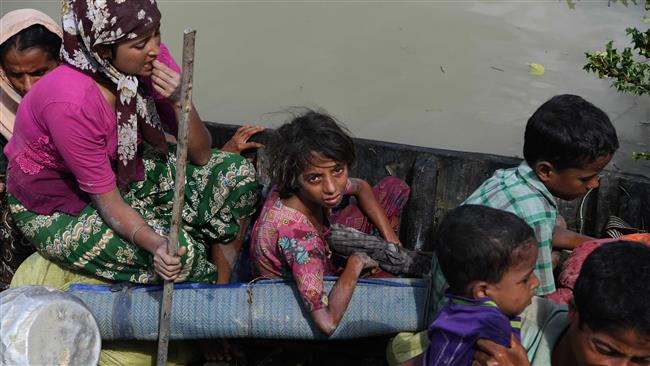
RNA - The UK-based rights group was responding to news on Sunday that a boat carrying Rohingya Muslims had capsized in Naf River separating Myanmar and Bangladesh, killing nearly two dozen of the refugees, including children, who were fleeing the government-backed violence in Rakhine.
In a statement issued a day after the tragedy, Amnesty’s Southeast Asia and the Pacific Director James Gomez demanded an immediate end to the restrictions imposed by Myanmar government officials on access to the predominantly Muslim-populated state, located in western Myanmar.
“The Myanmar authorities are actively blocking aid groups from reaching affected areas in northern Rakhine State, where people are on the brink of survival,” he said in a statement published on the organization’s official website. Gomez added that such restrictions “show a callous disregard for human life and must end immediately.”
The official added: “Today’s drowning and tragic loss of life is yet more evidence of the desperate situation still prevailing in Rakhine state. While the Myanmar military has engaged in a campaign of violence, there is mounting evidence that Rohingya women, men and children are now also fleeing the very real threat of starvation.”
Commenting on the sinking incident, the local commander of Bangladesh Border Guard, Lieutenant Colonel Ariful Islam said the vessel capsized close to Shah Porir Dwip, at the mouth of Naf River.
Survivors and officials have said the boat was carrying between 60 and 100 people. Bangladeshi officials said 23 refugees have so far been confirmed dead.
The recent sinking is only the latest of a series of sea tragedies involving Rohingya refugees. On September 28, a boat carrying about 80 refugees sank, leaving 28 dead and a large number missing.
Authorities in Myanmar, led by de facto leader Aug San Suu Kyi, have blocked access to Rakhine since August 25, when the military unleashed a fresh clampdown campaign against Muslim residents following a number of attacks against army and police posts there.
The crackdown, backed by radical Buddhist monks, has left scores of Rohingya villages torched and completely destroyed. There have also been numerous reports of systematic attacks against Rohingya Muslims in Rakhine, including random shootings and rape.
The UN estimates that some 519,000 in total have fled their homes in Rakhine and crossed into Bangladesh over the past six weeks.
On Monday, Bangladeshi officials reported a surge in the exodus, with reports of children dying from hunger, exhaustion and fever among the latest wave of refugees arriving in the country from Myanmar.
The UN has dubbed the military crackdown as an “ethnic cleansing” campaign against Myanmarese Muslims, who are denied full citizenship and branded illegal immigrants from Bangladesh.
Meanwhile, United Nations children’s agency (UNICEF) has voiced worries over the catastrophic humanitarian situation of Rohingya Muslims, who are trying to escape the government crackdown in Myanmar.
UNICEF noted that some 150 thousand women and children are in dire need of humanitarian support.
Aid agencies also say they need more than $500 million to address the needs of the Rohingyas living in Bangladesh’s Cox’s Bazar refugee camps.
847/940